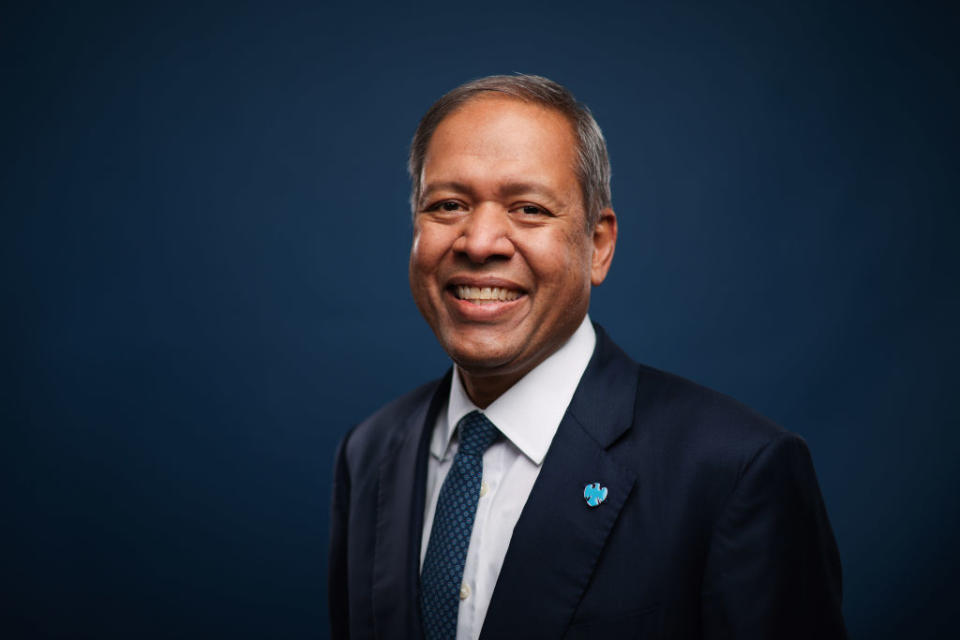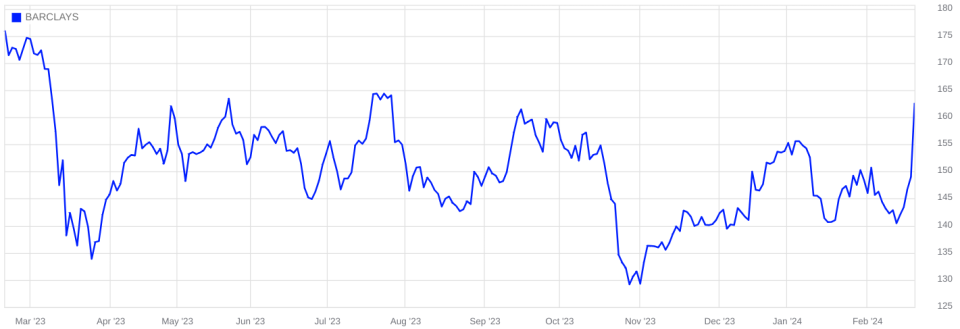Barclays embarks on biggest shake-up since financial crisis after difficult decade

Barclays has had a big day. Shortly after unveiling a drop in annual profits despite sky-high interest rates, the FTSE 100 bank revealed more details on a bold restructuring plan to reduce costs by £2bn and return at least £10bn to shareholders by 2026.
During a marathon investor presentation, chief executive CS “Venkat” Venkatakrishnan confirmed the bank would restructure into five new operating divisions, fully exit the European retail banking market and reposition 20,000 employees.
The £10bn target for shareholder returns represents some 40 per cent of Barclays’ current market capitalisation and compares with £7.7bn that the bank has paid out over the last three years.
A timeline of scandal
Today’s update was the first of its kind in nearly a decade. Ex-CEO Antony Jenkins announced a similarly ambitious strategy to scale back Barclays’ investment bank and cut 19,000 jobs in 2014 but was ousted the following year.
Jenkins was trying to restore confidence in the bank after it was fined in 2012 for manipulating the Libor benchmark, with the scandal ending the tenure of then-CEO Bob Diamond after just 18 months.
Jenkins’ replacement and Venkat’s predecessor was Jes Staley, who the FCA last year fined £1.8m and banned from holding any senior City job after it found he misled the regulator over his relationship with Jeffrey Epstein.
Staley had previously been fined £650,000 and ordered to hand back £500,000 of his bonus in 2016 for trying to identify a whistleblower using the bank’s internal security unit.
In 2020, dealmaker Amanda Staveley sued Barclays for giving her private equity firm less favourable treatment than other parties in the emergency £7.3bn fundraising that saved the bank from a state bailout in 2008.
She lost her case, although a High Court judge found that Barclays was “guilty of fraudulent misrepresentation” and had deceived Staveley.
City A.M. understands that funds tied to her firm are now seeking fresh damages at the International Chamber of Commerce in Paris.
In 2022, Barclays’ annual profits took a £1.6bn hit from litigation and conduct charges after it sold $17.7bn worth of US securities in error.
Barclays has led financial services firms in official customer complaints for years due to hundreds of branch closures, botched ISA transfers and closing accounts with little or no explanation.
Figures from the Financial Ombudsman Service showed 5,519 complaints logged against the lender between January and July last year.
The group’s UK consumer bank’s net promoter score ranks eighth out of the UK’s 12 biggest lenders, according to Ipsos’ latest Financial Research Survey in December.
Venkat acknowledged today that Barclays needed “to improve our customer experience and outcomes”. He added that the roughly £16bn spent on litigation and conduct over the last decade was “a very, very disappointing number.”
Struggling shares
Barclays posted lower annual profits and a three per cent cut to its bonus pool this morning.
However, it has softened the blow by unveiling plans for a new £1bn share buyback set to commence in the coming days.
Investors have bemoaned the bank’s share price, which has lagged behind many peers in both Europe and the US.
Although it rose more than nine per cent to its highest level since last July today, over the past five years the stock is flat, and it’s down more than seven per cent over the past 12 months.
The state-run Qatari Investment Authority – Barclays’ second-largest shareholder – cut its stake in the bank in half in December.
“Maybe banks are going to come back into fashion after all, if only because they start to function as cash machines rather than operate them,” said Russ Mould, investment director at AJ Bell.
“Helped by the buybacks, net asset value per share is growing at Barclays and – if it can keep its nose clean and avoid any fresh litigation and conduct costs and keep loan losses to manageable levels – that might be a start in persuading investors that its shares are too cheap, especially given the bumper cash returns.”

Investment bank conundrum
Today was crunch time for Barclays’ underperforming investment bank as Venkat is trying to rebalance the group’s business model towards retail and wealth management.
Barclays stands apart from domestic rivals Lloyds and Natwest in running a global investment bank, having acquired the US assets of Lehman Brothers for $1.8bn after it collapsed in 2008. The business is one of the biggest in Europe but still dwarfed by Wall Street giants like JP Morgan and Goldman Sachs.
Activist investor Edward Bramson lost a three-year battle to overhaul the bank when he sold his six per cent stake in Barclays in 2021. He had urged the group to scale back its investment bank and focus more on consumer operations.
Some investors have urged Venkat to ditch the largely US-based business entirely as it consumes huge amounts of capital while generating volatile returns.
It was reported in November that Barclays was exploring a plan to drop thousands of clients from its investment bank.
Although Venkat reiterated his confidence in the business today, he broke it up from the corporate unit, earmarked £700m in cost cuts and planned to cap risk-weighted assets at around 50 per cent by 2026.
“For over two decades, investors have been asking questions about the size and importance of the investment bank at Barclays,” he said. “Let me be clear, I’m proud of what we’ve achieved.”
Venkat added: “We’re the only non-US-domiciled investment bank that can consistently compete with the US banks and win.”
This morning’s results saw annual profits at the corporate and investment bank fall 21 per cent amid a slump in dealmaking and capital markets activity, although Venkat expects the latter unit to generate around £700m of income growth by 2026.
Jerry del Missier, Barclays’ former chief operating officer, told Sky News on Tuesday that equity capital markets was not “a viable business” for the group and had “a very, very small profit pool compared to the US”.
“Barclays’ huge presence in the investment banking world is an attractive proposition,” said Matt Britzman, an analyst at Hargreaves Lansdown. “But conditions are still poor and low activity in the capital markets continues to weigh on performance.”

 Yahoo Finance
Yahoo Finance 